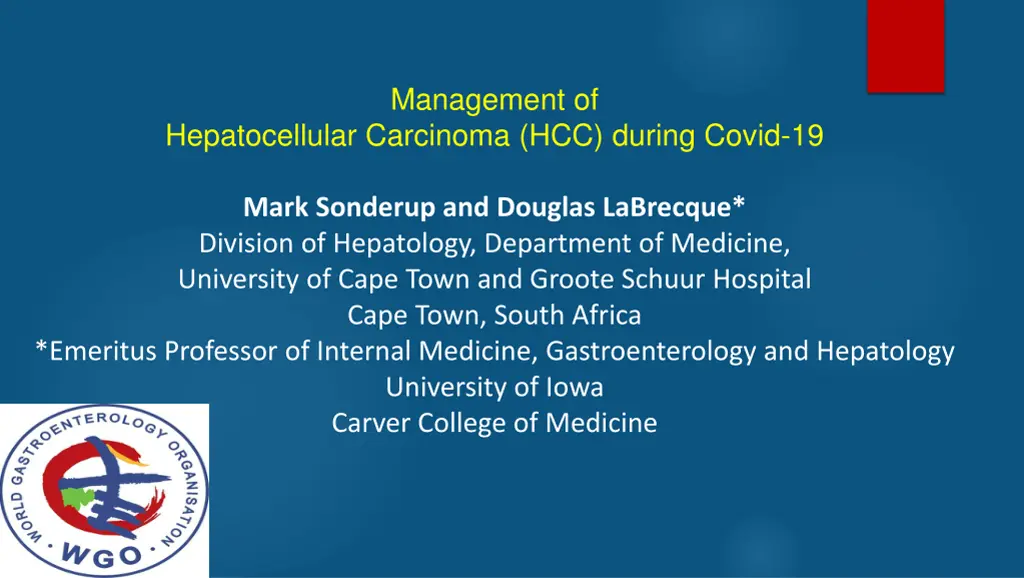
Management Strategies for Hepatocellular Carcinoma (HCC) during Covid-19
Learn about the management and risk mitigation strategies for Hepatocellular Carcinoma (HCC) during the Covid-19 pandemic. Explore recommendations for HCC surveillance, treatment principles, and non-surgical approaches to reduce risks for patients and healthcare staff. Understand considerations for surgical resection and transplant procedures amidst Covid-19 challenges.
Download Presentation

Please find below an Image/Link to download the presentation.
The content on the website is provided AS IS for your information and personal use only. It may not be sold, licensed, or shared on other websites without obtaining consent from the author. If you encounter any issues during the download, it is possible that the publisher has removed the file from their server.
You are allowed to download the files provided on this website for personal or commercial use, subject to the condition that they are used lawfully. All files are the property of their respective owners.
The content on the website is provided AS IS for your information and personal use only. It may not be sold, licensed, or shared on other websites without obtaining consent from the author.
E N D
Presentation Transcript
Management of Hepatocellular Carcinoma (HCC) during Covid-19 Mark Sonderup and Douglas LaBrecque* Division of Hepatology, Department of Medicine, University of Cape Town and Groote Schuur Hospital Cape Town, South Africa *Emeritus Professor of Internal Medicine, Gastroenterology and Hepatology University of Iowa Carver College of Medicine
HCC surveillance: Ultrasound plus alpha-fetoprotein COVID-19 risk mitigated, surveillance remains crucial Those without known COVID-19 (~manage as asymptomatic infection): a. Routine surveillance deferred e.g. non-cirrhotic chronic hep B b. Prioritize patients at increased risk e.g. elevated AFP, cirrhosis c. Screen using local available resources/protocols to limit COVID risk Patients with COVID-19: Surveillance deferred until after recovery -> manage then as non-COVID patients. Boettler T et al. JHEP Rep 2020 (2): 100113 . Fix OK et al. Hepatology 2020.
Treatment principles a. All patients evaluated for management of HCC must first be screened for COVID-19. b. Decisions on treatment and care plan via a multi-disciplinary process deviations from institutional protocols or standard treatment guidance recorded c. Where available and appropriate: telemedicine d. Ideally, treatment continued in a COVID free facility or realistically appropriate infection risk mitigating and standard PPE applied, where appropriate e. If curative therapy is to be deferred and disease control or bridging therapy used, very active monitoring should be in place. Lavarone M et al. Ann Oncol 2020. Tim Meyer, et al. COVID-19: ILCA Guidance. April 8, 2020.
HCC management and risk mitigation strategies Non-surgical approaches recommended in most cases to reduce stress and risks to patient, other patients, staff in the OR and ICU. Surgical resection considered: If surgery not deferrable -> select patients with lower risk profile for post-op decompensation as more comorbidities are associated with poorer COVID-19 morbidity and mortality i. ii. If anaesthetic capacity and clean OT availability iii. If dedicated non-COVID ICU available
Transplant Similar issues to surgical resection: anaesthetic capacity, ICU availability Limited ability to procure organs with restricted travel or inactive transplant networks; difficulty excluding SARS CoV-2 in donor Risks of COVID-19 mortality associated with immunosuppression* Living donor transplant should be deferred given excess risk to donor and recipient Bridging therapy should be offered to mitigate HCC progression risk and to allow for transplantation deferral *Qin,J. et al, Hepatology 2020
Specific interventions Ablation Including radiofrequency, microwave, percutaneous ethanol injection* Important use as bridging or even curative therapy (<2cm lesion, BCLC 0,A) however availability of anaesthesia, potential OT required Patent selection is vital: tumour position; single tumours <3cm; few/no co-morbidities so as to avoid excess COVID morbidity/mortality risk TACE/TARE Requires availability of bed capacity, interventional radiology Conventional TACE caries risk of greater COVID morbidity/mortality thus DEB-TACE or TARE advised given lesser immunosuppression risk Careful patient selection e.g. well compensated chronic liver disease > use scoring system in selection e.g. Up-to-7 criteria *Shiina,S. et al. Liver Int. 2012
Systemic therapy Patients on existing therapies at greater risk of severe COVID given immunosuppression potential and must be advised of such so as to mitigate infection risk Outpatient visits minimized > extended prescription fills allowed and monitoring continued (bloodwork) Follow up imaging deferred (especially if capacity limited) Current data on effects of immune checkpoint inhibitors and impact upon COVID-19 is very limited Treatment trials : No new recruitments - those already in trials need to be allowed ongoing treatment access in a risk mitigated manner in terms of follow up schedules, location etc.
Systemic therapy New patients treatment option best selected using performance status assessment New patients oral therapies e.g. sorafenib, lenvatinib avoid need for visits for IV infusions as with checkpoint inhibitors e.g. Nivolumab Monitoring (bloodwork) done remotely from treatment centre
